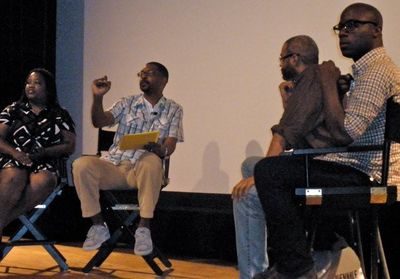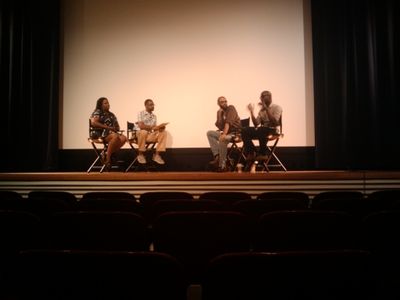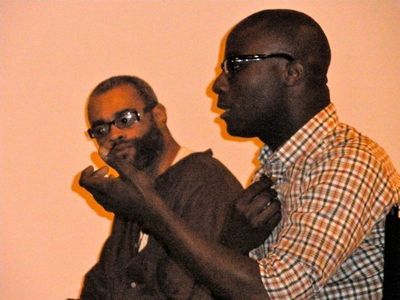l to r: Farai Chideya, Rob Fields, Boston Fielder, Barry Jenkins
photo: Yemi Toure
So, the first things first: It was an honor to participate in this year’s National Black Arts Festival. Thanks to Leatrice Ellzy, the programming director and outgoing executive director Stephanie Hughley, for the opportunity. It’s no small thing to be asked to participate in an event of this level, and I took the responsibility of my role as a panel moderator seriously.
Knowing that the panel that I’d organized with Medicine For Melancholy director Barry Jenkins; Kiss The Sky author Farai Chideya; and URB Alt’s Boston Fielder would come immediately after the film’s credits rolled, my job, I felt, was to frame things up properly. I mean, I really wanted to talk about Black rock, but I knew needed to step back and go big picture, especially since I knew folks in the audience would want to talk about the film and hear from Barry. I also wanted to connect the film to what I feel is the larger cultural shift taking place, and thereby help the audience understand why the three of us were there with Barry.
So I’m sitting in my hotel room, making notes and trying to get concise. I decided to take a break and check my Twitter folder in my email. I see that I’m now being followed by someone who goes by the name Bottom of Heaven. What’s serendipitous is that it turns out this is a great blog that focuses on “postmodern blackness”. Initially, I didn’t know exactly what that meant. But I liked how the site’s authors explained it, and it’s exactly what I needed when I needed it. As you’ll see, my remarks owe them a huge debt. So thanks to Claudia and Frieda. Anyway, here’s the substance of what I said:
I am going to suggest that we NOT look at this film in a vacuum.
Yes, it’s beautifully shot, yes it tells a compelling story, and yes, it’s gives us a depiction of Black folks many us haven’t seen. But we can’t talk about it in a vacuum because it didn’t come out of a vacuum.
“Medicine For Melancholy” is yet another example of post-modern blackness. I know, “post modern blackness” sounds like a heavy term to throw out on a Saturday night. But all it means is an approach or a way of looking at things that forces us to re-evaluate our assumptions about race, gender and, more importantly, representation, i.e., how we’re represented or how we’re representing.
It’s about challenging notions about
- what we listen to out of course,
- avenues through which we can express ourselves,
- even notions of what it means to be authentically black
You can see it in the work of artists like
- Dave Chappelle (or Elon James White)
- Kara Walker
- TV On The Radio, Janelle Monae, Dionne Farris
- Colson Whitehead, Farai Chideya
- Boston Fielder’s URB Alt Fest
- And, of course, Medicine For Melancholy
Bigger still, Medicine For Melancholy is part of a cultural shift that’s been going on for sometime. It’s a shift that exposes people who’ve been creating viable alternatives for years.
From an audience standpoint, I believe audiences are looking for works that nourishes them spiritually, emotionally, musically, intellectually, filmically, visually, “literarily.” You get the idea.
Broadband connections and online tools are helping these communities grow and attract more members
Millenials—those in their 20s—are bringing their sensibilities to bear, and they are beginning to shape culture.
Our president is the biggest example of the cultural shift.
So, no, this film isn’t an isolated incident.
And we started the discussion. Bottom line (which I tweeted earlier that day):
So: Black rock. Afro-Punk. It’s all an expression of postmodern blackness, huh? Thanks @claudia_m http://is.gd/1XJcy
photo: Karsh
Boston Fielder (l) and Barry Jenkins
photo: Yemi Toure
Additional links:
- Previous post about Black rock at NBAF ’09
- Medicine For Melancholy and the dynamism of blackness



